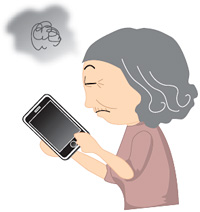Smartphones intimidate elderly
 Park Hyung-tae recently bought a Galaxy Note from Samsung Electronics, but it’s hard to imagine the 69-year-old using it without assistance from his children.
Park Hyung-tae recently bought a Galaxy Note from Samsung Electronics, but it’s hard to imagine the 69-year-old using it without assistance from his children.
“It’s very complicated to use. All I can do without the help of my children is make and receive calls and send text messages,” he complained adjusting his glasses. “Another problem is that the letters and icons on the screen are so small that I can only see them using a magnifying glass.”
Kim Hee-young, a visually handicapped man in his late 30s, also uses a smartphone made by a Korean firm. Countless functions and applications, if made accessible to him, could open new horizons for communication. However, an interface that is user-friendly for the visually impaired has yet to be produced.
“It appears that social discrimination against the disabled has perished to a great extent,” Kim said. “But smartphones may be one of the last obstacles hindering the disabled like me.”
Korea has grown as an undisputed world leading information technology (IT)powerhouse; and this rise is largely attributable to Seoul-headquartered IT giants, Samsung Electronics and LG Electronics, that manufacture the best-selling smartphones, refrigerators and other digital necessities in the world.
Yet this doesn’t necessarily mean everybody in the country benefits equally from the ever-advancing technology. Such are the experiences of Park and Kim, and most senior and disabled citizens who still struggle with limited access to high-end devices. This has led to calls for more attention on the issue from the government, product developers and manufacturers, and above all the general public.
The Ministry of Knowledge Economy said an estimated 7.97 million senior and disabled citizens accounting for 16.4 percent of the population have limited access to high-end IT equipment such as smartphones.
Local companies and developers are well aware of this, say analysts and industry observers. However the manufacturers are reluctant to augment designs and add new functions that would enable disabled people to use the high-tech devices because of fears about what this might cost, they explained.
Knowledge Economy Minister Hong Suk-woo echoed this view in a forum last week, calling on IT companies to pay greater attention to the problem to resolve it. The minister said the government is in talks with engineers, scholars and business leaders to launch such measures.
“We should deal with the issue with the mindset that we are all disabled,” Hong said during the forum held in preparation for policies on equal access to high-end IT equipment of all citizens — regardless of age and health conditions. “If glasses had not been invented, those who are now wearing glasses due to weak sight would have been treated as blind. All kinds of difficulties facing senior citizens and the disabled in the use of IT devices are resolvable.”
Among those who attended the forum were Yoon Boo-keun, Samsung Electronics’ president of TVs and appliances; Shin Moon-bum, executive vice president of LG Electronics; Rep. Kim Jung-rok of the ruling Saenuri Party; Koo Bon-hak, CEO of rice cooker maker Cuckoo; and Hong Joon-kee, CEO of water purifier manufacturer Woongjin Coway.
The latest smartphones, rice cookers, TVs, water purifiers, cleaning robots, and washing machines are all equipped with new functions to improve user access and were on display. But a blind attendee said after testing them that he didn’t feel satisfied with them.
“All in all, they are convenient to use,” said Seo Won-seon, a secretary of lawmaker Choi Dong-ic of the main opposition Democratic United Party. “But I found some minor shortcomings which I think are easily resolvable with help from people like me.”
He suggested it be made mandatory for disabled people to participate in designing new products.
After the forum, Yoon told The Korea Times that his company will “make greater efforts” to improve the user interfaces of products to a level where old and physically handicapped people no longer feel devices are inconvenient to use.
The government plans to launch a forum of experts specializing on the issue in September in a move to enact a law awarding favors to cooperative firms. <The Korea Times/Park Si-soo>

























































